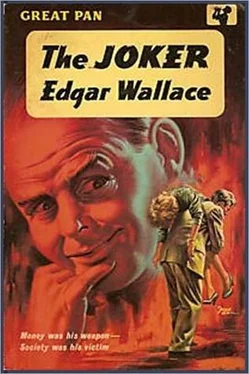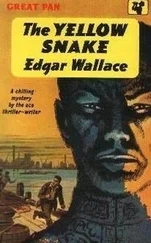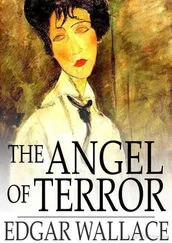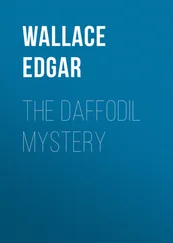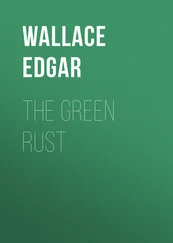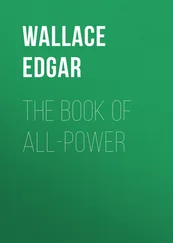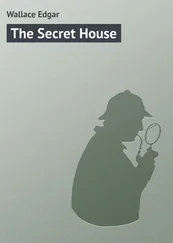Edgar Wallace - The Joker
Здесь есть возможность читать онлайн «Edgar Wallace - The Joker» весь текст электронной книги совершенно бесплатно (целиком полную версию без сокращений). В некоторых случаях можно слушать аудио, скачать через торрент в формате fb2 и присутствует краткое содержание. Год выпуска: 0101, Жанр: Старинная литература, на английском языке. Описание произведения, (предисловие) а так же отзывы посетителей доступны на портале библиотеки ЛибКат.
- Название:The Joker
- Автор:
- Жанр:
- Год:0101
- ISBN:нет данных
- Рейтинг книги:5 / 5. Голосов: 1
-
Избранное:Добавить в избранное
- Отзывы:
-
Ваша оценка:
- 100
- 1
- 2
- 3
- 4
- 5
The Joker: краткое содержание, описание и аннотация
Предлагаем к чтению аннотацию, описание, краткое содержание или предисловие (зависит от того, что написал сам автор книги «The Joker»). Если вы не нашли необходимую информацию о книге — напишите в комментариях, мы постараемся отыскать её.
The Joker — читать онлайн бесплатно полную книгу (весь текст) целиком
Ниже представлен текст книги, разбитый по страницам. Система сохранения места последней прочитанной страницы, позволяет с удобством читать онлайн бесплатно книгу «The Joker», без необходимости каждый раз заново искать на чём Вы остановились. Поставьте закладку, и сможете в любой момент перейти на страницу, на которой закончили чтение.
Интервал:
Закладка:
He pointedly ignored the presence of the girl except to put a chair for her.
‘I’ve been making inquiries,’ said this surprising ex-convict, ‘and I’ve discovered that Sir Joseph is in all sorts of financial difficulties. This is unknown to the Prime Minister or even to his closest friend, but I have had a hint that he was very short of ready money and that his estates in Cheshire were heavily mortgaged. Now, Mr Carlton, do you conceive it as possible that the speech in the House was made with the deliberate intention of slumping the market and that Sir Joseph was paid handsomely for the part he played?’
As he was speaking, he clasped his hands before him, his fingers intertwined; he emphasised every point with a little jerk of his clasped hands and, watching him, the mist rolled from Jim Carlton’s brain, and he instantly solved the mystery of those private film shows which had kept Mr Ingle locked up in his flat for a week. And to solve that was to solve every mystery save the present whereabouts of Sir Joseph Layton.
He listened in silence whilst Ingle went on to expound and elaborate his theory and when the man had finished: ‘I will bring your suggestion to the notice of my superiors,’ he said conventionally.
It was evidently not the speech that Mr Ingle expected. For a moment he looked uncomfortable, and then, with a laugh: ‘I suppose you think it strange that I should be on the side of law and order—and the governing classes! I felt a little sore when I came out of prison. Elk probably told you of the exhibition I made of myself in the train. But I’ve been thinking things over, Carlton, and it has occurred to me that my extremism is not profitable either to my pocket or my mind.’
‘In fact,’ smiled Jim, ‘you’re going to become a reformed character and a member of the good old Tory party?’
‘I don’t know that I shall go as far as that,’ demurred the other, amused, ‘but I have decided to settle down. I am not exactly a poor man, and all that I have got I have paid for—in Dartmoor.’
Only for a second were the old harsh cadences audible in his voice. He nodded towards Aileen Rivers.
‘You’ll persuade this girl to give me a chance, Mr Carlton? I can well understand her hesitation to keep house for a man liable at any moment to be whisked off to durance, and I fear she does not quite believe in my reformation.’
He smiled blandly at the girl, and then turned his eyes upon Jim.
‘Could you not persuade her?’
‘If I could persuade her to any course,’ said Jim deliberately, ‘it would not be the one you suggest.’
‘Why?’ challenged the other.
‘Because,’ said Jim, ‘you are altogether wrong when you say that there is no longer any danger of your being whisked off to durance. The danger was never more pressing.’
Ingle did not reply to this. Once his lips trembled as though he were about to ask a question, and then with a laugh he walked to the table and took a cigar from the box.
‘I guess I won’t detain you,’ he said. ‘But you’re wrong, Carlton. The police have nothing on me! They may frame something to catch me, but you’ll have to be clever to do even that.’
As they passed out of the building:
‘I seem to spend my days giving warnings to the last people in the world who ought to be warned,’ said Jim bitterly. ‘Aileen, maybe you’ll knit me a muzzle in your spare moments? That will help considerably!’
The outstanding feature of this little speech from the girl’s point of view was that he had called her by her name for the first time. Later, when they were nearing her boarding house, she asked: ‘Do you think you will find Sir Joseph?’
He shook his head.
‘I doubt very much if he is alive,’ he said gravely.
But his doubts were to be dispelled, and in the most surprising manner. That night a drunken black-faced comedian hit a policeman over the head with a banjo, and that vulgar incident had an amazing sequel.
CHAPTER 16
THERE is a class of entertainer which devotes its talents to amusing the queues that wait at the doors of the cheaper entrances of London’s theatres. Here is generally to be found a man who can tear paper into fantastic shapes, a ballad singer or two, a performer on the bones and the inevitable black-faced minstrel.
It was eleven o’clock at night, and snow was lightly falling, when a policeman on point duty at the end of Evory Street saw a figure staggering along the middle of the road, in imminent danger from the returning theatre traffic. The man had obviously taken more drink than vas good for him, for he was howling at the top of his voice the song of the moment; and making a clumsy attempt to accompany himself on the banjo which was slung around his neck.
The London police are patient and long-suffering people, and had the reeling figure been less vocal he might have passed on to his destination without interference. For drunkenness in itself is not a crime according to the law; a man must be incapable or create a disturbance, or obstruct the police in the execution of their duty, before he offends. The policeman had no intention of arresting the noisy wayfarer.
He walked into the middle of the road to intercept and quieten him; and then discovered that the reveller was a black-faced comedian with extravagant white lips, a ridiculous Eton collar and a shell coat. On his head was a college cap, and this completed his outfit with the exception of the banjo, with which he was making horrid sounds.
‘Hi, hi!’ said the policeman gently. ‘A little less noise, young fellow!’
Such an admonition would have been sufficient in most cases to have reduced a midnight song-bird to apology, but this street waif stood defiantly in the middle of the road, his legs apart, and invited the officer to go to a warmer climate, and, not satisfied with this, he swung his banjo, and brought it down with a crash on the policeman’s helmet.
‘You’ve asked for it!’ said the officer of the law and took his lawful prey in a grip of iron.
By a coincidence, Jim Carlton was at Evory Street Station when the man was brought in, singing not unmusically, and so obviously drunk that Jim hardly turned his head or interrupted the conversation he was having with the inspector on duty, to look at the charge. They made a rapid search of the man, he resisting violently and at last, when they had extracted a name (he refused his address) he was hustled between a policeman and a jailer into the long corridor off which the cells are placed.
The door of Cell No. 7 was opened and into this he was pushed, struggling to the last to maintain his banjo.
‘And,’ said the jailer when he came back to the charge-room, wiping his perspiring brow, ‘the language that bud is using would turn a soldier pale!’
The reason for Jim’s presence was to arrange a local supervision of Greenhart House and to obtain certain assistance in the execution of a plan which was running through his mind; and that task would have been completed when the black-faced man was brought in, but that the officer he had called to see was away. Jim lingered a little while, talking police shop, before he paid his last visit to Sir Joseph’s house. He had the inevitable reply: No News had reached Whitehall Gardens of the Foreign Minister.
The man he came to see at Evory Street was due to appear at the police court in the role of prosecutor and Jim strolled down to the court next morning, arriving soon after the magistrate had taken his seat. There he met the inspector from Evory Street. Before Jim could broach the subject which had brought him, the inspector asked:
‘Were you at the station when that black-faced fellow was pulled in last night?’
‘Yes, I remember the noisy gentleman,’ said Jim. ‘Why?’
Читать дальшеИнтервал:
Закладка:
Похожие книги на «The Joker»
Представляем Вашему вниманию похожие книги на «The Joker» списком для выбора. Мы отобрали схожую по названию и смыслу литературу в надежде предоставить читателям больше вариантов отыскать новые, интересные, ещё непрочитанные произведения.
Обсуждение, отзывы о книге «The Joker» и просто собственные мнения читателей. Оставьте ваши комментарии, напишите, что Вы думаете о произведении, его смысле или главных героях. Укажите что конкретно понравилось, а что нет, и почему Вы так считаете.
